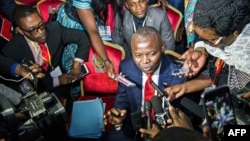Opposition parties walked out of talks on elections in the Democratic Republic of Congo Monday, saying their position on the order in which presidential and local elections should be held is non-negotiable. A spokesman for the ruling coalition said the walk-out is a negotiating tactic and the talks are not over.
The talks began September 1 and this is the first time the opposition party members, who make up about one-third of the 285 people taking part, have suspended their participation en masse.
Only a few of the country's dozens of opposition parties have been taking part in the dialogue anyway, so it is questionable whether any agreement reached here could overcome the obstacles to elections.
But even this minority group now says it cannot agree with the proposal by the ruling coalition, that the country should vote in local elections before the presidential poll.
The leading opposition spokesman at the dialogue, Vital Kamehre, told the media why his group is insisting that the presidential elections must be held first.
He says the binding election for which the timetable is clear in the constitution is for president. All the elections (local, provincial and national) are constitutional, he says, but there's a fixed timetable for the presidential election in order to avoid a national crisis.
Kamehre also suggested local elections could take a long time to organize.
The majority proposed holding local elections first, he says, but since the decentralization we now have some districts that overlap and others that have no population. How long will it take to sort that out?
Last year, the government went ahead with a decentralization program, more than doubling the number of provinces from 11 to 26.
A spokesman for the ruling coalition, Emanuel Shadari, played down the disagreement.
He says the opposition has said it's suspending its participation, but the dialogue is not over, and the opposition has not left the dialogue. It's a negotiating tactic, he adds.
There are other groups at the dialogue, drawn from civil society organizations such as churches, trade unions, non-governmental organizations and traditional chiefs. There also are senior politicians and others. According to Shadari, most of these groups support the proposal that local elections be held before presidential elections.
The African Union appointed facilitator of the dialogue, Edem Kodjo, said Monday after the opposition walkout that talks already have started between the stakeholders to create conditions for a resumption of the work in committees.
Observers said the dialogue is likely to continue Tuesday.




